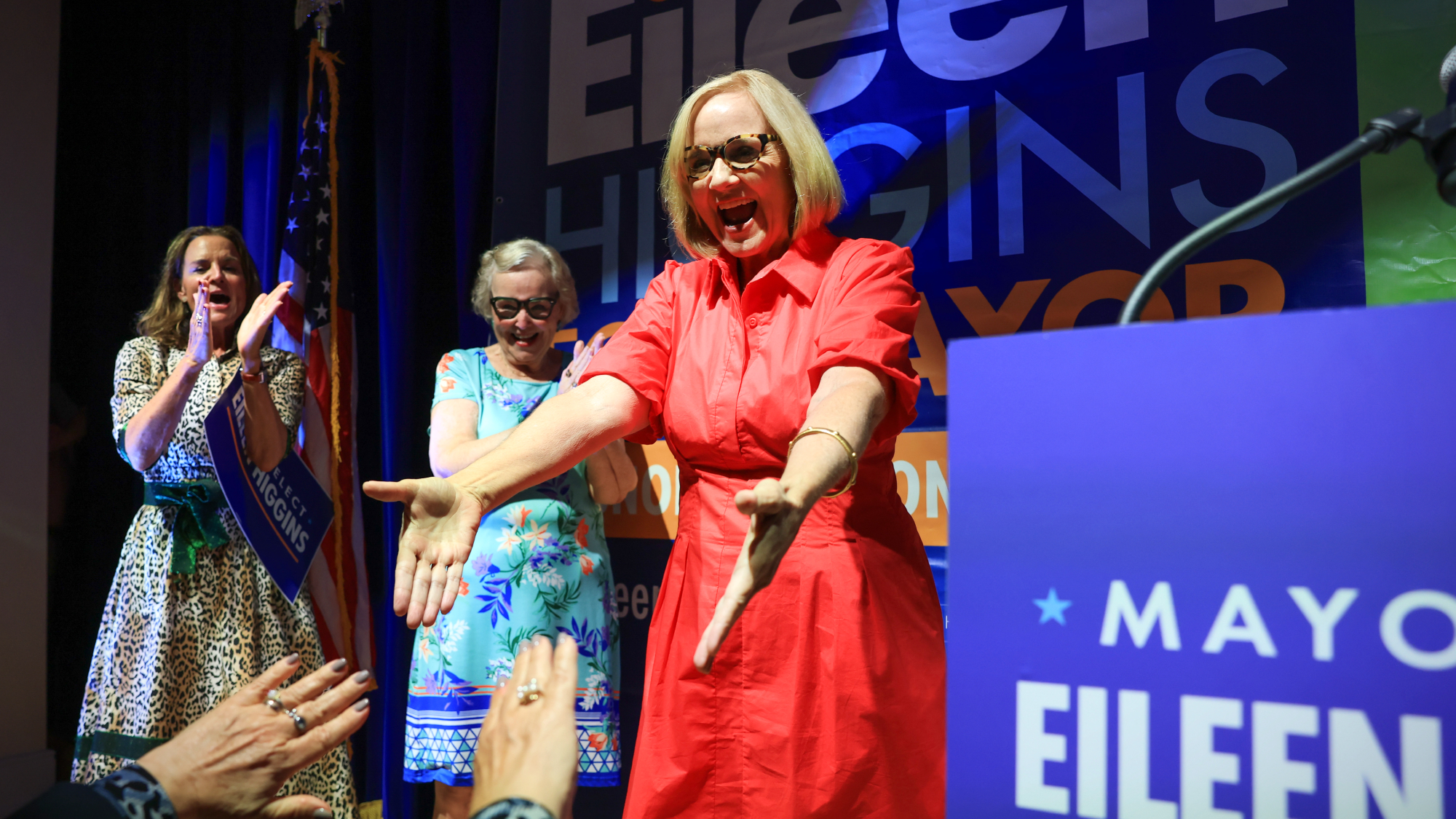In defense of Florida's open beaches
They are no more risky than New York City's open parks


A free daily email with the biggest news stories of the day – and the best features from TheWeek.com
You are now subscribed
Your newsletter sign-up was successful
It's fun and easy to dunk on Florida. Even Floridians do it. I mean, sinkholes! Boiled Gatorade! Alligators where there should not be alligators! "Florida man," haha!
So when Florida Gov. Ron DeSantis (R) permitted his state's beaches to begin reopening amid the coronavirus pandemic — and Jacksonville promptly availed itself of that option — criticism was predictably swift and harsh. #FloridaMorons trended on Twitter. "I guess in a way it makes perfect Florida-sense," tweeted actress Bette Midler. "To try to get a little sun so you look healthy at your funeral."
Haha, I guess, but opening the beaches isn't such a wild idea, provided social distancing is maintained as DeSantis directed. Though permitted to reopen, Florida's beaches aren't supposed to operate as usual. "No sunbathing, towels, blankets, chairs, coolers, grills, etc. will be permitted on Duval County beaches during the restricted hours they are open," directed the Jacksonville announcement. Group activities are prohibited; public bathrooms and pavilions are closed; beachgoers are expected to avoid contact with people outside their households.
The Week
Escape your echo chamber. Get the facts behind the news, plus analysis from multiple perspectives.

Sign up for The Week's Free Newsletters
From our morning news briefing to a weekly Good News Newsletter, get the best of The Week delivered directly to your inbox.
From our morning news briefing to a weekly Good News Newsletter, get the best of The Week delivered directly to your inbox.
"This is not a time to lounge," said Atlantic Beach Mayor Ellen Glasser. "This is not a time to party. This is a time where you need to exercise, keep moving, and then go home."
Set aside our assumptions about Florida and this isn't unreasonable. Is walking on a beach somehow more dangerous than walking through a park? New York City, site of the single worst COVID-19 outbreak in the country — and boasting a higher population density than any place in Florida — has kept city parks open for exercise. The guidelines for park use are, in fact, remarkably similar to Jacksonville's present beach rules: Solo exercise is permitted. Team sports and group gatherings are not. A major difference is New York's decision to keep many of its park restrooms open to the public. On that point, Jacksonville is the more cautious municipality. (There's a sentence no one thought they'd ever read.)
Assuming social distancing, opening beaches is a good thing. One advantage is it increases the tolerability of stay-at-home orders, and the protests popping up around the country show tolerability is a serious consideration. "It bugs me to see these restrictions on people being outside," Dr. Edward Nardell, a Harvard School of Public Health specialist in airborne infection, told Slate. "Mental health means something as well."
Nardell deemed outdoor transmission of the coronavirus "possible but improbable." And for some nontrivial number of people, being able to take a walk on the beach will make social distancing more bearable for a longer time. They'll find it easier to make safe choices in daily life if they're allowed this outlet. That's a public health benefit, not a loss.
A free daily email with the biggest news stories of the day – and the best features from TheWeek.com
But the very act of going to the beach can itself be a boon to public health. "The science could not be clearer: The benefits of getting outside vastly outweigh the risk of getting infected in a park," wrote a trio of Harvard scientists at The Washington Post earlier this month. "Outdoors, the virus quickly disperses in the air," they add, and "walking past someone should not induce fear or panic — these short walk-bys are low risk for transmission of the coronavirus." (Early research indicates indoor transmission, especially via HVAC systems, is a much bigger concern than outdoor spread.)
The Post story recommends precautions that are by now familiar: Always wear a mask while you're visiting a park. Keep 6 feet away from others as much as possible, allowing a wider berth if you're running or doing some other exercise that has you breathing hard. Try not to touch stuff other people have touched. Don't touch your face. Take off your shoes and wash your hands when you get home.
Ah, but will Floridians comply?
"Most people are abiding by the rules of no sunbathing, no using towels or chairs," Jacksonville reporter Troy Kless tweeted, with photo evidence. Those not in compliance get warnings from the police, he said. Mask use appears to be uncommon, which is stupid but hardly unique to Florida. (I was in the minority wearing a mask at the grocery store last week here in Minnesota, a cultural and geographic anti-Florida if there ever was one.) Drone footage — more useful than still images, where space between people can be difficult to gauge — shows ample distance between beachgoers in Jacksonville the first evening beaches were open, and on a local NBC/ABC affiliate's live feed of the Jacksonville beach as of this writing, I see one solitary dot that might be a person.
As delightful as I find a Florida lawyer's plan to protest-stalk his state's beaches in a Grim Reaper costume, the outrage over Florida's beaches is silly and unfair. With spring break crowds (which would be dangerous) long gone, opening beaches for safe, socially distant exercise is no riskier — and no less beneficial to public health — than open parks in New York and elsewhere around the country.
On this one, we can cut Florida a break.
Bonnie Kristian was a deputy editor and acting editor-in-chief of TheWeek.com. She is a columnist at Christianity Today and author of Untrustworthy: The Knowledge Crisis Breaking Our Brains, Polluting Our Politics, and Corrupting Christian Community (forthcoming 2022) and A Flexible Faith: Rethinking What It Means to Follow Jesus Today (2018). Her writing has also appeared at Time Magazine, CNN, USA Today, Newsweek, the Los Angeles Times, and The American Conservative, among other outlets.
-
 The Gallivant: style and charm steps from Camber Sands
The Gallivant: style and charm steps from Camber SandsThe Week Recommends Nestled behind the dunes, this luxury hotel is a great place to hunker down and get cosy
-
 The President’s Cake: ‘sweet tragedy’ about a little girl on a baking mission in Iraq
The President’s Cake: ‘sweet tragedy’ about a little girl on a baking mission in IraqThe Week Recommends Charming debut from Hasan Hadi is filled with ‘vivid characters’
-
 Kia EV4: a ‘terrifically comfy’ electric car
Kia EV4: a ‘terrifically comfy’ electric carThe Week Recommends The family-friendly vehicle has ‘plush seats’ and generous space
-
 The billionaires’ wealth tax: a catastrophe for California?
The billionaires’ wealth tax: a catastrophe for California?Talking Point Peter Thiel and Larry Page preparing to change state residency
-
 What have Trump’s Mar-a-Lago summits achieved?
What have Trump’s Mar-a-Lago summits achieved?Today’s big question Zelenskyy and Netanyahu meet the president in his Palm Beach ‘Winter White House’
-
 Bari Weiss’ ‘60 Minutes’ scandal is about more than one report
Bari Weiss’ ‘60 Minutes’ scandal is about more than one reportIN THE SPOTLIGHT By blocking an approved segment on a controversial prison holding US deportees in El Salvador, the editor-in-chief of CBS News has become the main story
-
 Miami elects first Democratic mayor in 28 years
Miami elects first Democratic mayor in 28 yearsSpeed Read Eileen Higgins, Miami’s first woman mayor, focused on affordability and Trump’s immigration crackdown in her campaign
-
 Has Zohran Mamdani shown the Democrats how to win again?
Has Zohran Mamdani shown the Democrats how to win again?Today’s Big Question New York City mayoral election touted as victory for left-wing populists but moderate centrist wins elsewhere present more complex path for Democratic Party
-
 Millions turn out for anti-Trump ‘No Kings’ rallies
Millions turn out for anti-Trump ‘No Kings’ ralliesSpeed Read An estimated 7 million people participated, 2 million more than at the first ‘No Kings’ protest in June
-
 Miami Freedom Tower’s MAGA library squeeze
Miami Freedom Tower’s MAGA library squeezeTHE EXPLAINER Plans to place Donald Trump’s presidential library next to an iconic symbol of Florida’s Cuban immigrant community has South Florida divided
-
 Florida wages crosswalk war on public displays of pride
Florida wages crosswalk war on public displays of prideIN THE SPOTLIGHT Gov. Ron DeSantis' campaign comes for colorful crosswalks, as Florida residents engage in guerrilla graffiti as a form of resistance
